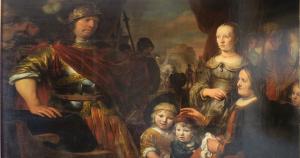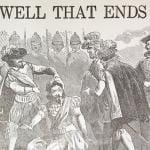The Mob
No more talking on’t. Let it be done. Away, away!*
 So says the mob always: don’t think, talk, but act. After all, mobs know what is wrong, what they need, and who the chief enemy is. If they are, perhaps wrong, this does not matter, or so the mob feels, because they will get what they want: bread and the blood of the oppressor.
So says the mob always: don’t think, talk, but act. After all, mobs know what is wrong, what they need, and who the chief enemy is. If they are, perhaps wrong, this does not matter, or so the mob feels, because they will get what they want: bread and the blood of the oppressor.
The mob is irrational and wishes to act, but whatever they do the results will not be good. If they riot for food, they will spoil more than they eat. If they mobilize for riches, they will despoil all the accumulated wealth of the city quickly and destroy the capacity to create more.
The end of mob rule is greater starvation, poverty, and death.
The Demagogue
There is, however, a danger as great: the demagogue who will talk, but not reason and turn the mob to his will. The people are used for his purposes and again there will be greater starvation, poverty and death, except for the demagogue. “Mysteriously” his cronies and he will have more food, greater wealth, and be kept safe.
“Mobs for them (the stranger, the alien) and not for us!” powers the demagogue and may raise him up to be a tyrant.
A mob does not care how what they wish is achieved, just that “they” are punished and the goal (free food!) is met. That by the time the prize is won, it may be soaked in blood is not relevant. The demagogue sees this weakness and exploits how quickly the evils come with mob rule.
He restrains the immediate evils and so wins even the support of some of the righteous.
The Unifying War?
This is the situation facing “Rome” in William Shakespeare’s play Coriolanus. Injustices are met with rioting, demagoguery, and pay offs. Things do not seem like they could get worse, until they do: a neighbor is coming to subjugate Rome. The coming war may, some hope, do the good of unifying the city, forcing the the rulers to do hard duty leading the army, and whip the mob into an army.
All of this fails, as fail it must, because even if Rome wins, the rot has been covered up and will quickly return. Rome wins, thanks to the selfless service of Caius Martius before the city of Corioles. Martius wins, but the herd is still the herd and the rulers are still more concerned with their personal peace and affluence than the city. “Coriolanus” is an honorific, a name given to Caius Martius for his great courage and sacrifice serving his city in battle. Rome would have ceased to be free if not for Coriolanus.
The hero of the battle should be a leader, but the sickness of the city wounds his noble soul. Coriolanus does his duty, but he cannot hear the just complaints of the poor, he can see only the mob. The hero does not catch that not all men, even leaders, can do as he has done. He thinks he must either tell the truth in a harsh way or flatter. To his credit, given those two choices, he will do neither.
These are false choices. Coriolanus could be gentle, but his education, received from his pious mother, fails him. He has learned dignity, piety, and gravity in his homeschool, but not faith, hope, and charity. He has learned the lessons of the past, but takes too little thought of his wife, son, and the future.
When the best person in the city, or any organization, can only do his duty, even courageously, without creativity or gracefulness, then that group is doomed however strong at the start.
External Success is No Cure
The war cannot unify the city, even in victory, because even divvying prizes and honors brings all the problems back to the surface. Defeat might, in fact, teach a lesson and so the city be saved.
There is an iron law here for politics, business, or any organization: winning does not purge vice and short term victory will not last. The very success of an organization will embolden and multiply the vice: the mobs want more, the elite become effete. As for the heroes? They gain a just sense of superiority that will destroy all. The city needs grace, but the mob wishes grace on the cheap, the rulers are busy selling grace to the highest bidder, and those with some virtue long so much for justice that they cannot find grace in their hearts.
Somehow the poor must receive food with mercy, the leaders be removed without rioting, and the best learn to do justice with compassion.












